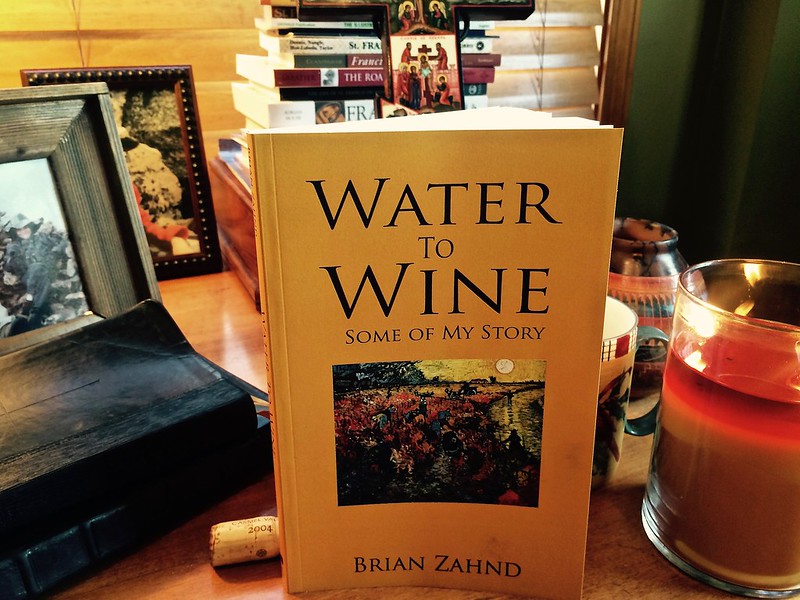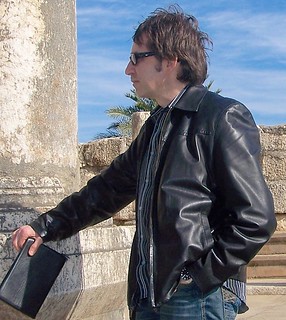Why I Wrote “Water To Wine”

Why I Wrote “Water To Wine” Brian Zahnd
Today is the release date for my new book, Water To Wine: Some of My Story. I wrote this book because I could not not write this book. I was compelled to justify my journey and give some guidance to fellow seekers.
Over the past twelve years I’ve gone through a tremendous spiritual and theological transition. Some friends, pastors, and former church members have been critical of these changes. But many more have found hope and encouragement in my spiritual pilgrimage. Water To Wine is written for all these people. For my critics this is my humble, yet earnest, defense. For those who have found my journey helpful and have asked for some direction, this is it.
Most of all I wrote Water To Wine for the multitudes of Christians who are sold on Jesus, but have come to feel that pop-Christianity is too watery and too thin. They are right…it is. And I want to help. I hope the story of how I found my way out of cotton-candy Christianity and into a richer and more robust faith may help point these seekers in the right direction. Perhaps you are one of them.
Instead of trying to reproduce the book in this blog post, I want to share a thousand words — a thousand words selected from throughout the introductory first chapter. I hope it will whet your appetite.
BZ
* * * * *
I was halfway to ninety — midway through life — and I had reached a full-blown crisis. Call it a garden-variety mid-life crisis if you want, but it was something more. You might say it was a theological crisis, though that makes it sound too cerebral. The unease I felt came from a deeper place than a mental file labeled “theology.”
* * * * *
From a certain perspective things couldn’t have been better. I had a large church with a large staff supported by a large budget worshiping in a large complex. I was large and in charge! I had it made. But I had become increasingly dissatisfied. I was weary of the tired clichés of bumper-sticker evangelicalism. I was disenchanted by a paper-thin Christianity propped up by cheap certitude. It was safe, but it failed to enchant. I was yearning for something deeper, richer, fuller. Let me say it this way — I was in Cana and the wine had run out. I needed Jesus to perform a miracle.
* * * * *
My faith in Jesus never wavered. This was not a “crisis of faith” in that sense. I believed in Jesus! What I knew was that the Jesus I believed in warranted a better Christianity than what I was familiar with.
* * * * *
I knew there had to be something better than the shallow “success-in-life” charismatic evangelicalism that had been my world for more than twenty years. Like Bilbo Baggins, I felt “thin, sort of stretched, like butter that has been scraped over too much bread.”
* * * * *
Grape juice Christianity is what is produced by the purveyors of the motivational-seminar, you-can-have-it-all, success-in-life, pop-psychology Christianity. It’s a children’s drink. It comes with a straw and is served in a little cardboard box.
* * * * *
I needed something living that came from the oak barrels of a vintner, not something concocted from the aluminum vats of an industrialist. I was no longer satisfied with the “cutting edge” and “successful.” I had lost my appetite for the mass-produced soda-like Christianity of North America. I wanted vintage wine from old vines. I don’t know exactly how I knew this, but I knew it.
* * * * *
I wasted away to a paltry 130 pounds. People thought I was sick. I looked sick. I felt so weak. I remember thinking, “I’m dying.” And that was more true than I could have known! The whole first half of my life was dying — a half of life characterized by the quest for certitude and success. As Richard Rohr describes it, I was about to “fall upward” into the second half of life. But it wouldn’t be easy.
* * * * *
I once heard an Italian winemaker say that to produce good wine the grapes must struggle, they must suffer. The taste of good wine is the taste of struggle and suffering mellowed into beauty. There’s a deep truth there that applies to far more than winemaking — it also applies to the formation of the soul.
* * * * *
2004 is the watershed, the continental divide of my life. It wasn’t a pleasant year — it was a painful year — but I wouldn’t trade it for anything. Not for anything! The beautiful Christianity I have found in the second half of life could not have come into being apart from pain.
* * * * *
People I had known, loved, and led for many years were beginning to dig their heels in or bail out. Some didn’t like my “new direction.” They couldn’t see what I saw with what I called my “new eyes.” In their frustration they lashed out. Some said I was becoming “emergent.” (I honestly didn’t even know what that was — and I don’t think they did either.) Others said I was becoming “liberal” or “too intellectual.” Some of my less articulate critics simply opted for “backslidden.”
* * * * *
The pain of being misunderstood and misrepresented was part of the price for obtaining the vintage wine of substantive Christianity. No matter what others thought, I knew what was happening. I was saving my soul. I was discovering Jesus afresh. I was encountering an unvarnished Jesus, a Jesus free from the lacquer of cheap religious certitude, tawdry motivational jargon, and partisan political agenda. I was being born again…again. I was gaining new eyes. I was seeing the kingdom of God, really for the first time. I was transitioning from water to wine, from grape soda to Brunello di Montalcino.
* * * * *
The pressure came from living on the fault line between two shifting tectonic plates. One plate was moving me away from a compromised Christianity co-opted by consumerism. The other plate moved stubbornly in the direction of the pragmatic need to maintain a viable congregation. I wanted to be faithful to lead my church in a new and better direction, but I didn’t want to go about it in a reckless manner. Inevitably I would feel guilty about whatever decision I made. I would feel guilty about making changes too slowly and I would feel guilty about making changes too quickly…at the same time! It was the pressure of what felt like an impossible situation.
* * * * *
In the world of religious certitude there is no room to think, no room for nuance and complexity, no room to nurture the soul of a mystic. In my search for success in the world of Americanized Christianity, the real me was being erased. I wanted to become myself again. I didn’t want to lose my soul to an enforced conformity.
* * * * *
I was walking through the Detroit airport on one of those moving walkways thinking about these things when I crossed a threshold in my mind. I made a decision. A daring decision. A risky decision. I had reached the point of no return — there would be no going back. I wanted to be my true self. Suddenly I said out loud, “Now with the help of God I shall become myself!” The curious glances I drew from strangers in the Detroit airport bothered me not in the least. I had made a decision. I was on the road to recovery. I was recovering my soul. Water was turning to wine.
* * * * *
(Water To Wine: Some of My Story is available exclusively from Amazon.)
